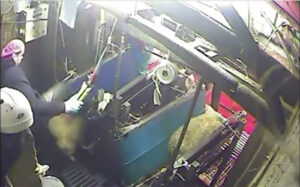 Following the news of the animal abuse caught on camera at a Halal slaughterhouse in Yorkshire, Gary Trotter, general manager at Hadrian Technology, comments on how CCTV could have prevented this from turning into a major incident and urges all businesses to think about how they are protecting themselves and their staff.
Following the news of the animal abuse caught on camera at a Halal slaughterhouse in Yorkshire, Gary Trotter, general manager at Hadrian Technology, comments on how CCTV could have prevented this from turning into a major incident and urges all businesses to think about how they are protecting themselves and their staff.
Undercover footage, recorded and released by animal rights group Animal Aid, has shown the extent of the animal abuse taking place inside a Thirsk-based Halal abattoir over a three-day period. Four slaughterhouse workers have had their operating licences suspended and one has been sacked, as a result of images showing sheep being kicked, punched and thrown into machinery by staff.
Campaigners and MPs are now calling for independently monitored CCTV cameras to be made mandatory in all British slaughterhouses.
Gary Trotter says: “This incident highlights how important it is for not just slaughterhouses but all businesses to have CCTV in place. In this industry, it is vital in protecting animal welfare and in protecting the slaughterhouse as a business. With all the negative publicity surrounding this particular story, the slaughterhouse’s reputation has been damaged and this is likely to have serious repercussions in business terms.
“Every time an incident like this happens, a spokesperson from the business concerned says that it is an isolated incident and is not reflective of the manner in which they run the business. Who believes that?
“If these businesses genuinely wanted to be transparent they would proactively take the necessary steps to be able to demonstrate their claims, and the installation of High Definition Internet Protocol (HD-IP) CCTV systems would be one way of achieving that.
“If this abattoir had installed CCTV, and was using it to its full potential with cameras focused on all the areas where animals are kept and killed, there would be a deterrent to abuse, and the workers now being accused of mistreatment could have been caught much earlier on. High definition cameras provide crystal clear image quality and facial recognition software, so employers can quickly and easily see which staff members are involved in a given incident.
“As well as being able to ascertain which workers were at fault, the other benefit the abattoir would have experienced by having CCTV in place would have been the prevention of the abuse of a significant number of animals. It has been reported that around 4,000 sheep were killed unlawfully over the three-day period.”
Although this is obviously an extreme and shocking example of actions taken by staff going undetected due to lack of surveillance, Gary Trotter notes that this serves as a good reminder for all businesses to seriously consider investing in CCTV systems.
He continues: “Having suitable CCTV provision protects both employers and employees. Employers are able to quickly spot anything going on before it escalates to become a major incident, and employees that are not doing anything wrong can rest assured that they will not be held to account. CCTV is an effective deterrent, so this type of animal abuse may not have happened at all if the perpetrators knew they were being watched.
“Any business could find themselves in a similar situation to the abattoir – there have been reports of abuse going on in places such as care homes and hospitals in recent years. With the potential of losing staff, contracts and damaging business reputation, I would ask if employers can afford not to install CCTV. Hopefully this incident will lead to further discussion of this topic and encourage more businesses and organisations to seriously consider how to protect their interests and reputations.”



